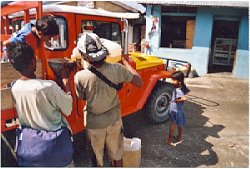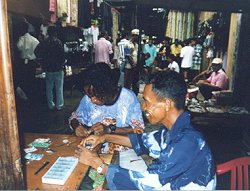

|
DILI, December 2000.
IT'S A LITTLE HARD to imagine how a lack of resources makes everything so different. This place makes one realise what we take for granted. Power, for instance. It is so hot here that you need a fan to sleep. Riding my bike into the neighbourhood the other night I felt a certain dread. There were only candles lighting the houses: the power was off again. When the power is off the fan doesn't work. I cna live with electric pump not pumping the water and that the fridge goes off. But it's very hard without a fan. Sometimes the power has been off all night which generally, for me, means no sleep.
The other night I got quite scared. I was lying naked under my mosquito net sensing that it was hotter outside my body than in. And I suddenly wondered if it was possible to just die from heat, like people who fall asleep in their sauna. I dragged myself out of bed, into some shorts and mosquito repellent and wandered around outside until I felt my blood was circulating, again. Outside is not cooler but sometimes there is a little breeze that gives relief. Indoors it is so still.
I find this place so unexpected. When I mentioned this to an Auzzie who works for Chubb doing the security systems around town, he asked me what I had expected, and I couldn't answer him. I knew there would be a lack of resources but I didn't know how that pans out in day to day life, like that building materials are too expensive for your average person, so nothing much is getting repaired. I knew there was trauma, but not how it has affected people, that they would have such a sadness behind the smile they put on when they tell you how the militias wrecked this place and shot anyone who stayed in Dili. I knew there had been destruction, but I hadn't translated that into burnt out buildings everywhere and what that meant in terms of poverty and a standard of living that is only just higher than in the worst parts of Africa. And how small and thin people generally are. I think many people don't get enough to eat here, even now.
 Some of the things that reflect the standard of living can even seem a
little quaint if you can close your eyes to the fact that it wasn't like
this two years ago and shouldn't be like this now. For instance, a petrol
station is a row of full plastic containers sitting out in front of a shed
at the side of the road. A vehicle pulls up and the service station
attendant brings out a large funnel with a mesh to filter. One person
holds the funnel and the other empties a container into the vehicle.
It's so hot, and so many people smoke, I keep expecting one of these
petrol stations to ignite.
Some of the things that reflect the standard of living can even seem a
little quaint if you can close your eyes to the fact that it wasn't like
this two years ago and shouldn't be like this now. For instance, a petrol
station is a row of full plastic containers sitting out in front of a shed
at the side of the road. A vehicle pulls up and the service station
attendant brings out a large funnel with a mesh to filter. One person
holds the funnel and the other empties a container into the vehicle.
It's so hot, and so many people smoke, I keep expecting one of these
petrol stations to ignite.
How can people afford to smoke? Third World tobacco prices. Even malaes can
buy ciggies for 1$A a pack for Marlboroughs. The locals buy Indonesian
kerek or the clove cigarettes from Indonesia cheap, too.

Alright! The power just came back on. I saw a bulletin circulated around by the UN intranet, yesterday that said to expect more and longer power cuts. It said they are expecting a new power supply but not till the new year. Someone pointed out that the new year doesn't necessarily mean January or even February. The new year extends all the way to December, 2001.
